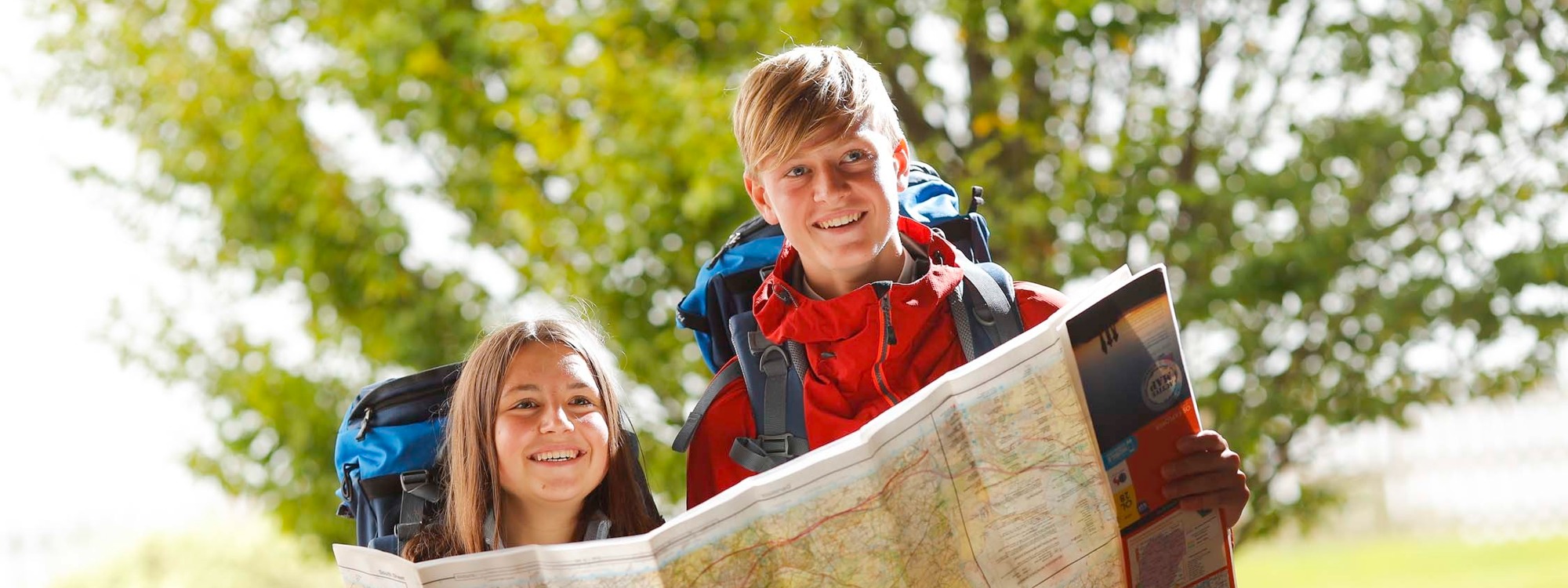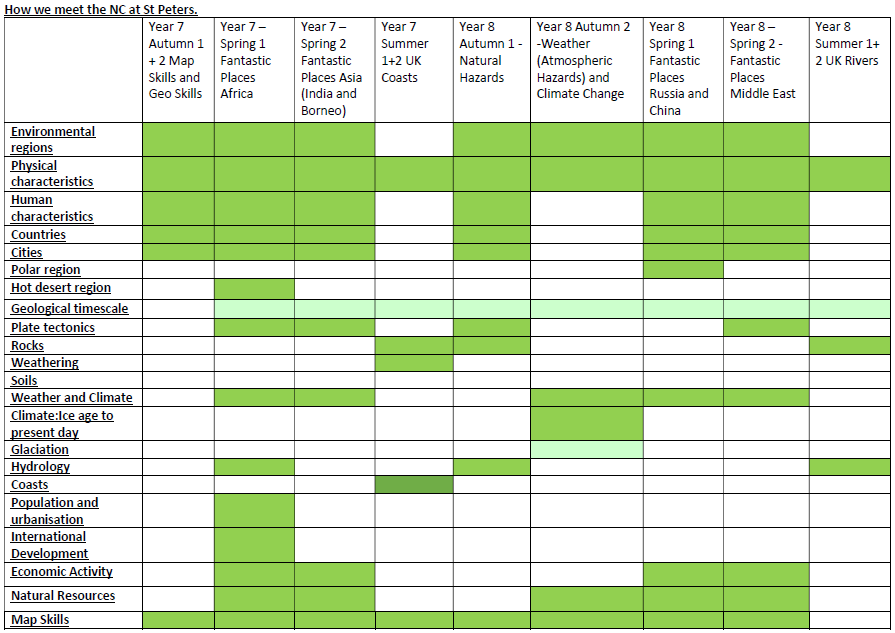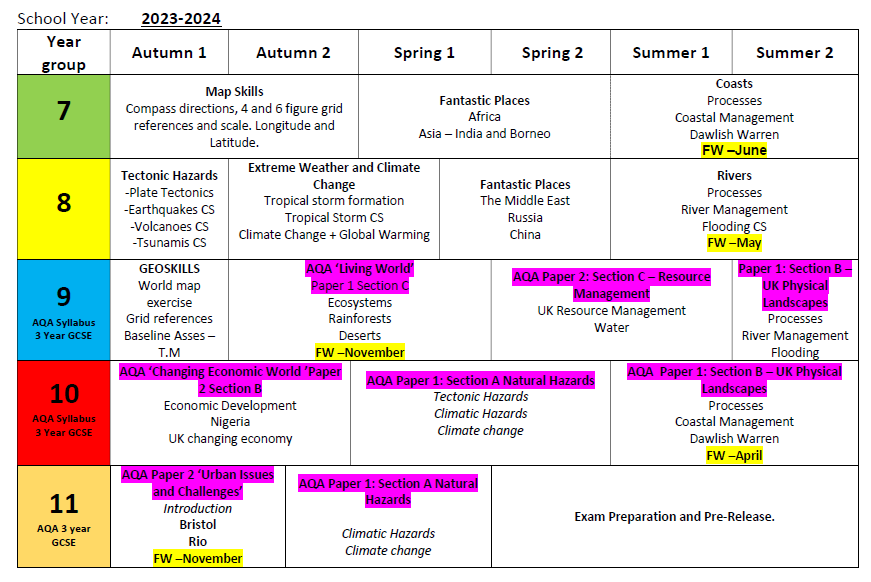
News - 9th Jun 2023

Geography Department Curriculum 2023-24
Transition and building on KS3 / KS3
Pupils start with the topic ‘GeoSkills and Map skills’ which helps them with the transition from KS2 to KS3. This gives all pupils the same KS2 overview and allows them to all start their KS3 Geography having had the same recap and review.
KS3
The aim of the Geography curriculum at St Peters is to:
INTENT
Our Geography curriculum encourages students to be curious about the world they live in and about processes that are happening in the world today. It aims to take students beyond their own personal experiences. The geography curriculum at St Peters is all about making students excited about the relationships between humans and the environment at a local, national, and global level.
Devon is home to many diverse landscapes including North and South Devon coastlines, Dartmoor and the River Exe and therefore St Peters students will have first-hand experience of the physical processes that take place to create and change these landscapes. By gaining specific geographical knowledge about these processes that shape our local landscapes and beyond, students are given a toolkit that gives them the power to explain and analyse these processes. St Peters students’ have the power to explain and analyse these processes by seeking explanations about the world they live in and apply geographical ideas about alternative futures.
Fieldwork is a fundamental aspect of the St Peters geography curriculum, as students experience the power of primary (first-hand) data collection (which can then be triangulated with secondary data), as they apply theory from substantive knowledge by witnessing, recording and evaluating the geographical processes occurring in their local area.
The study of Geography is designed to inspire a curiosity and fascination about the world and its people that will remain with them for the rest of their lives.
How our subject curriculum is sequenced and why we plan it this way:
Discussion within the department to consider the topics to be taught and the sequencing of these topics. Thought is given to the complexity of the subject matter and when is most appropriate to deliver this content. Consideration is given to how it will enable pupils to make the most progress.
In year 7 topics are designed to lay the foundations for their Geography learning with transferable skills and common Geographical themes and issues that can be then transferred across KS3 and KS4. These topics are designed to give pupils background knowledge to then be built upon.
How we connect the knowledge over the key stages (deliberate connections):
Students begin with ‘Map skills and Geo skills’ that covers all the KS2 curriculum strands such as lines of latitude and longitude, physical geography and human geography and continents, UK Geography, Europe and North America. This then enables them to build on and develop their KS3 curriculum. Our KS3 curriculum makes links to KS4 but ensuring that the basic knowledge for all units at KS4 is taught at KS3.
How we make our subject knowledge stick:
Through regular retrieval activities at the start of every lesson and through careful planning and questioning to highlight the links with other aspects of the curriculum at St Peters these are known as our ACT Nows.
This is supported by the homework schedule which is designed to complement the curriculum taught in lessons.
Concepts and themes run through the course and the curriculum is planned to build on previous learning within the same year and previous years
Key skills are planned and taught through each year and become more complex over time, although more able students are challenged to go beyond.
Key aspects of knowledge are repeated through retrieval practice to help enable progress through the units.
Regular retrieval practice including repetition
Implicit teaching of tier 3 vocabulary.
End of topic assessments that mirror the exam style questions for KS3 and past papers/ questions for KS4. Pupils are given advance notice so have the opportunity to revise.
How We Allow All Students to Succeed (including SEND and disadvantaged )
How we allow all students to reach our ambitious subject end points:
Carefully planned and sequenced curriculum
Careful seating plans and use of prior data such as Classcharts, pupil passports and reading ages
Strategies from pupil passports are used to support SEND pupils.
Parental contact to communicate students’ progress
Planned intervention for targeted Year 11 students after school
Department spreadsheets enable recording and monitoring of students’ progress and identify where support is required


Curriculum Impact- How we measure attainment and progress:
Geography assessment happens in many ways.
Assessment takes place in every Geography lesson. Short, day to day assessment happens as google form quizzes, writing answers on mini white boards, true/false statements and teacher led questioning. Feedback can be self and peer assessment where pupils are invited to identify their own success and an area for improvement. Once a topic has been completed, pupils will complete a more formal assessment based on geography benchmarks and we can make a final evaluation of pupil achievement. This is a combination of knowledge and understanding based on shorter questions worth 1-4 marks and then longer questions with opportunities for extended writing. Geographical skills are also assessed with analysis and interpretation of a variety of maps at different scales as well as graphs and geographical data.
At KS4, assessment is still continuous during every lesson with a greater focus on recall based on the previous lesson. Pupils are given sample assessment materials and past GCSE papers at the end of a topic to evaluate knowledge and understanding plus developing their exam technique and command words. Prelim exams focus on knowledge and understanding and include a wide range of skills.
2023-24 NC links
Expectation National Curriculum and how we @ St Peter’s are meeting those expectations:
Locational knowledge
Extend their locational knowledge and deepen their spatial awareness of the world’s countries using maps of the world to focus on Africa, Russia, Asia (including China and India), and the Middle East, focusing on their environmental regions, including polar and hot deserts, key physical and human characteristics, countries and major cities.
Place Knowledge
Understand geographical similarities, differences and links between places through the study of human and physical geography of a region within Africa, and of a region within Asia
At St Peter’s we have introduced a unit of work called ‘Fantastic Places’ in Year 7 and 8. Throughout this unit of work pupils explore: Kibera in Africa, Borneo in SE Asia, India, China, Russia and Antarctica. Within this unit of work students are understanding the different locations, unique characteristics and the impact of major cities. Pupils will also make links between places by looking for similarities and differences. For example, Kibera and the study of India.The Middle East is taught as part of our Passport included within the Map Skills unit and a separate unit in year 8.
Human and physical geography
Understand, through the use of detailed place-based exemplars at a variety of scales, the key processes in:
At St Peter’s we teach physical geography throughout both year 7 and 8. From coasts in year 7, to climate change (year 8), natural hazards and rivers in year 8. As well as a trip to the Jurassic Coast whereby we explore geological timescale at Seaton Jurassic as well as looking at how the coast is managed at Sidmouth.
At St Peter’s human geography is taught throughout year 7 and 8 in a variety of different ways. Population and urbanisation is taught within the Fantastic Places unit through Kibera and India as well as in year 8 through our development unit. Natural resources is taught through our sustainability unit at the start of year 8.
International development, economic activity in the primary, secondary, tertiary and quaternary sectors is all taught within the development unit at the end of year 8.
At St Peter’s we believe this is taught throughout each unit in KS3. For example coastal and river management. Mitigation of climate change etc